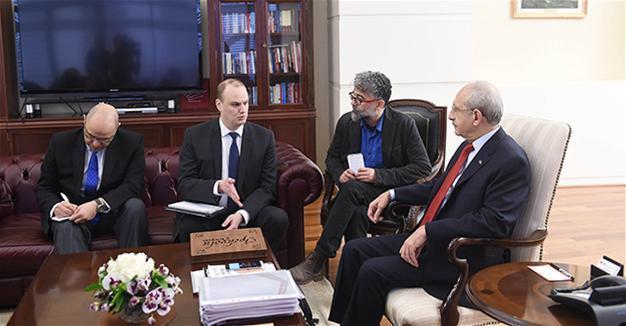Turkish democracy at risk of returning to pre-1789 French revolution conditions: CHP
Serkan Demirtaş - ANKARA

The approval of government-proposed constitutional amendments in the April 16 referendum will bring Turkey’s democracy back to pre-1789 French Revolution conditions, main opposition Republican People’s Party (CHP) head Kemal Kılıçdaroğlu has said, criticizing the government for creating an environment in which saying “No” is akin to committing a crime.
“[If the changes are approved] democracy will to a large extent be suspended. Everything will be decided by one man ... Parliament will lose its ability to legislate. Decisions on the structure and functions of the state will be made solely by the president. From all these perspectives, Turkish democracy will return to the conditions of before the French Revolution,” Kılıçdaroğlu told the members of the International Media Freedom mission on March 2.
The mission is composed of a number of prominent press institutions like the International Press Institute (IPI) and Reporters Sans Frontiers (RSF), and organized a tour to Turkey to show solidarity with imprisoned journalists and their families.
In his address to the mission, Kılıçdaroğlu said “around 90 percent” of the Turkish media was under the government’s control, but even this is not enough for the government.
“The state of media freedom in Turkey is one of the most worrying areas. In a country where media is unfree, so are the people, because it means their right to be informed has been taken away,” he added.
The CHP head told the mission that over 150 journalists are today behind bars “without even knowing what they are accused of.
“Depriving journalists of their freedoms gives Turkey the image of an undemocratic country. In the 21st century, imprisoning a journalist for criticizing the government is a shame on democracy,” he said.
‘Judiciary under government control’The justice system in Turkey is also under the control of the government and there could not be so many journalists in prison if the judiciary was independent, Kılıçdaroğlu added.
“The pressure imposed by the government prevents the judiciary from issuing independent verdicts. Judges and members of the judiciary are afraid of being accused of being a member of [the Fethullahist Terror Organization] FETÖ if they don’t order the imprisonment [of dissidents],” he said.
Campaigning for ‘No’ deemed a crime Describing the government’s actions since the failed July 2016 coup attempt as a “civilian coup” because of the massive purge of bureaucrats and arrest of thousands of people including journalists and academics, Kılıçdaroğlu said Turkey faces the prospect of turning into a “party state.”
“Turkey is going to referendum under these conditions. Citizens and civil society organizations are not allowed to freely campaign for ‘no,’ even though the government and all state offices have begun campaigning. These are very hard conditions but we’ll secure a ‘No’ in the ballot box. We’ll bring democracy to our country, however much they impose pressure on us,” he stated.
‘OSCE should monitor referendum’ CHP head Kılıçdaroğlu also recalled that he met a delegation from the OSCE’s Office for Democratic Institutions and Human Rights (ODIHR) last week and requested an observation mission for the upcoming referendum.
“We hope the government accepts this OSCE mission,” he said.
‘EU also responsible for poor justice independence’ Responding to a question on the extent to which international pressure could have a positive effect on the state of the media freedom and the release of imprisoned journalists, Kılıçdaroğlu stressed the importance of keeping this issue on the agenda during bilateral meetings with Turkish authorities.
“But I am worried about the extent to which this will have an impact, because there is currently a diktat-based understanding that prefers the implementation of the uncivilized world rather than civilized one,” he said.
On the EU’s approach, Kılıçdaroğlu said “judicial independence in Turkey was lost” in the 2010 referendum, in which a package of constitutional amendments overhauling the judicial structure was put to a vote.
“At that time, the EU endorsed the amendments and supported the move. Now we are paying the price for that,” he added.
‘No permission to visit imprisoned journalists’For his part, the spokesman for the mission, Steven M. Ellis, said the reason for their visit to Turkey was the deterioration in media freedom and the rising number of arrested journalists.
“We are in Turkey because we’re gravely concerned about the freedom of the media. We want to show our solidarity with jailed journalists and their families but unfortunately we’re not allowed to visit imprisoned journalists,” Ellis added.
 The approval of government-proposed constitutional amendments in the April 16 referendum will bring Turkey’s democracy back to pre-1789 French Revolution conditions, main opposition Republican People’s Party (CHP) head Kemal Kılıçdaroğlu has said, criticizing the government for creating an environment in which saying “No” is akin to committing a crime.
The approval of government-proposed constitutional amendments in the April 16 referendum will bring Turkey’s democracy back to pre-1789 French Revolution conditions, main opposition Republican People’s Party (CHP) head Kemal Kılıçdaroğlu has said, criticizing the government for creating an environment in which saying “No” is akin to committing a crime.